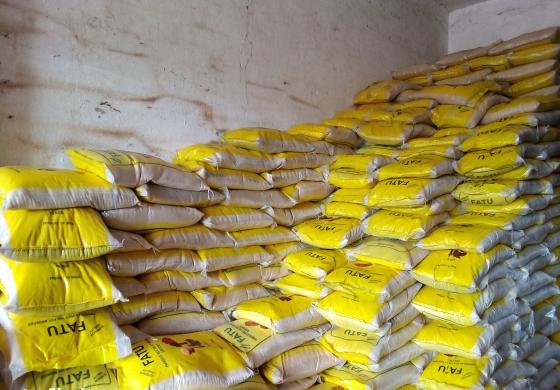Rice Importers on Go-Slow Action?

This is the fanfan rice that is now surplus in the market but people are not going for the long grain parboiled rice.
It has been a hectic week for rice retailers at many commercial hubs in and around Monrovia, as wholesalers are forced to increase the price of their rice per bag due to the sudden difficulty they experience in securing sufficient supply from the importers.
The long grain parboiled rice was sold for US$13.00 to wholesalers and then given to the retailers for US$13.50 because they were not responsible for transporting the rice to their shops and stores. Besides, the importers were not selling a specific amount to them but now, importers are only selling 10 bags to individuals.
“Before, when rice was surplus, importers would come to our shops begging us to buy or do sell-pay and we would pay for any amount of rice we wanted and they would bring it to our business centers. But now you will have to go to the Freeport of Monrovia, stand in line, buy the rice and then transport it yourself and bring it to the market. So the government expects us to sell it for US$13.50,” John Teddy, a wholesaler, selling at ELWA junction said.
Teddy explained that every time the rice is scarce in the market, people who are not selling will begin to inflate the price in order to generate huge profits. “Today, Commerce Ministry Inspector Josephine Davis was at Fouani Brothers office in Vai Town, Monrovia and they (importers) were selling only 100 bags at a time to individuals for US$13.00, but they give it to you to transport it yourself so the price will increase,” Teddy added.
According to him, most times when the government increases tariffs, the importers will hoard the commodity to compel the government to reduce the tariff. “Once the tariff is high and the government doesn’t want to allow the importers to add additional 50 cents or dollar, they will carry on a go-slow action.”
“Rice is our staple food in Liberia. So I am begging the government. If there is any way to help the importers, let them do it,” Teddy pleads. Yesterday when the Daily Observer toured Red Light and ELWA junction areas, surprisingly the price of other rice was still the same. However, the price of parboiled rice had increased to US$19.50. This has also affected the most basic retail unit of the commodity, which is the sale of rice by cup, which is now sold for L$50.
Information gathered around markets yesterday revealed that importers are pointing to the rise in the global price of rice as justification of the need to hike the price of the commodity above US$13.00. However, importers claim that the government has downplayed their request so they are left with no option but to hoard their goods in order to pressurize the government to agree to their demand.
Joseph W. Clarke, who sells at Red Light market, said the Government must ensure the rice issue is settled so Liberians can have access to their staple food. “We, Liberians, our staple food is rice, so if the importers are saying the price of rice has increased on the whole market, let the government have a dialogue with them.”
Clarke is also demanding the government to do an investigation into whether these importers are telling the truth or making up stories just so they can increase the price to generate more profit.
“Let the government investigate and come up with a good suggestion that will favor the citizens,” he added. According to him, it was last week he went in search of rice and the importers were only selling 10 bags at a time to wholesalers like him, whereas before the importers could sell him any amount or even come to his shop to credit him the goods, which he would pay for after selling them.
Because of this situation Madam Wenwu Yougie, a wholesaler in Red Light, is now selling a bag of rice for US$14.50. “Three days, I couldn't find rice. It was yesterday [that] I was lucky to get rice and I had to transport it myself. I paid $L70 as transport for one bag.” She narrated that she and other wholesalers were surprised last week when importers started selling only ten bags to individuals who now had to stand in long lines to get the rice.
